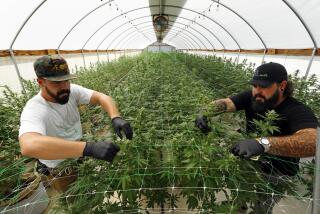New Medicines Urged to Battle Narcotics Use : Drug war: Sen. Biden proposes development of “blockers,” other drugs to counter addicts’ cravings.
- Share via
WASHINGTON — Sen. Joseph R. Biden Jr. (D-Del.), contending that the federal government has disregarded promising medical treatments for narcotics addiction, on Wednesday proposed a 10-year strategy to encourage development of new anti-drug medicines.
Biden, chairman of the Senate Judiciary Committee, released a committee report recommending a national agenda to speed development of such treatments. He said he would use the report as a model for legislation he hopes to submit when Congress recovenes in January.
“Drug addiction is, among other things, a medical ailment, a disease that requires medical treatment,” Biden said. “While no one expects to find a ‘magic pill’ that eliminates drug addiction, expert researchers agree that we could be doing more . . . to develop new treatments.”
The committee proposal calls for outlays of $1 billion over 10 years for research into drug treatment medicines by the National Institute of Drug Abuse, extension of the Orphan Drug Act to cover such medicines and regulatory reform to speed their availability.
The proposal aims to encourage further development of three types of medicines for treating narcotics addiction.
The first type of medication, such as imipramine, reduces drug cravings during withdrawal.
A second type substitutes a synthetic addictive drug such as methadone for a more harmful narcotic such as heroin. The committee called for development in the next three years of a synthetic drug for treating other addictions as well as a better alternative to methadone.
A third type of medicine, such as Naltrexone, blocks an addict’s enjoyment of a drug. The committee proposed developing similar blockers for cocaine and heroin as early as 1997.
“I hope these recommendations can be debated over the next few weeks, reviewed and critiqued in the President’s forthcoming drug strategy report and then adopted as quickly as possible next year,” Biden said. “The promise is there, the need is urgent, and we must start right away.”
Although Biden acknowledged that the Bush Administration has allocated substantial resources toward education, law enforcement and rehabilitation as deterrents to drug use, he criticized its lack of investigation into medical solutions.
Asked about the Biden report at a breakfast session with reporters Wednesday, William J. Bennett, drug control policy director, said: “I don’t accept the charge” that the need for further research had been overlooked in the Administration strategy.
Bennett acknowledged that medical research on drug abuse has lagged far beyond studies into AIDS, for example, but he said that probably would change as a result of the 40% increase in federal funding provided by the Administration’s anti-drug program.
“Research will follow the money,” Bennett said.
Biden said drug addiction policy should be modeled after the government’s AIDS strategy.
Staff writer Douglas Jehl contributed to this story.
More to Read
Sign up for Essential California
The most important California stories and recommendations in your inbox every morning.
You may occasionally receive promotional content from the Los Angeles Times.













